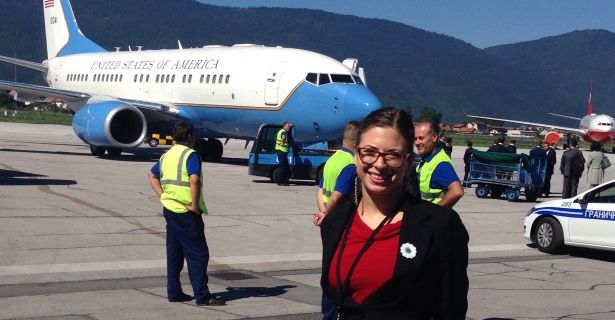Two months later, I don’t know how much closer I am to an answer.
Talking to people in Sarajevo, Republika Sprska, and Belgrade, you understand that not only did they not have problems with the other ethnic group, they barely noticed they were different. Bosnians and Serbs, Romas and Jews, Croats, etc. lived intermingled before the war, dating each other, marrying each other, having babies together, working together, trading bread for sugar from one another. There goes that “centuries old ethnic hatred” argument. Under the Communist period, differences were shunned and religion was outlawed- hence, their identities figured more around being Yugoslav than anything else. Evidence of this is the sameness of the Bosnian, Croatian, and Serbian languages.
Today, there is a claim that Bosnian, Serbian, and Croatian are different languages. Calling those languages different is tantamount to calling American English and British English two separate languages; a few spelling differences, dialects, and slang are about all that differentiate them.
The trained eye also can’t tell the difference between a Bosnian and a Serb.
One of the biggest ironies of the war is that the snipers and armies firing at civilians, bombing marketplaces, suffocating the city, couldn’t delineate whether he was firing at a Bosnian Serb, a Bosnian Croat, Muslim, Jew, Roma, American, Brit, whatever. All the sniper knew was that he was supposed to aim and fire and kill, and all the person who wanted to cross the street knew was that she better bolt as fast as she could because the highest likelihood of being shot was when one was in the middle of an intersection.
So how did the war happen? I think that leadership played a major role. Tito’s fall introduced a major power vacuum, and opportunistic leaders such as Milosevic saw that space to advance their own agendas and augment their power. It didn’t help that Belgrade had been the capital of the former Yugoslavia, which made the Serbs feel entitled to other pieces of Yugoslavia, as well as have the military might, the tanks, the troops, the resources, to barrage Bosnia.
What was particularly frightening about the siege of Sarajevo was that civilians were strategic targets of war. It was the part of the horrifying trend of the targeting of civilians to advance an armed group’s agenda. It sickens me to think that this trend has now become so normalized that one barely blinks an eye when a suicide bomb explodes in a marketplace or a leader gasses his own people.
Even the Bosnians don’t understand how war erupted. “It was crazy,” one man said to me. “We lived together and all of a sudden we were supposed to be enemies. Crazy.”
Opportunistic leaders will seize on any seeming difference to convince people to fight under them, whether it be ethnicity, religion, gender, or favorite kind of pizza. The key is to help people recognize when they are being manipulated and give them the tools and power to resist it.


Add new comment